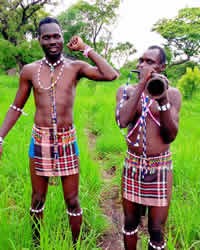Luwo in South Sudan

Photo Source:
Anonymous
|
Send Joshua Project a map of this people group.
|
| People Name: | Luwo |
| Country: | South Sudan |
| 10/40 Window: | No |
| Population: | 254,000 |
| World Population: | 254,000 |
| Primary Language: | Luwo |
| Primary Religion: | Ethnic Religions |
| Christian Adherents: | 35.00 % |
| Evangelicals: | 10.00 % |
| Scripture: | New Testament |
| Ministry Resources: | Yes |
| Jesus Film: | Yes |
| Audio Recordings: | Yes |
| People Cluster: | Nilotic |
| Affinity Bloc: | Sub-Saharan Peoples |
| Progress Level: |
|
Introduction / History
The Luwo people—also known as Jur Chol, Jur Luo, or Lwo—are a Nilotic ethnic group residing primarily in Western Bahr el Ghazal and Northern Bahr el Ghazal States of South Sudan, particularly in Jur River, Wau, and Aweil counties. They speak the Luwo language, a Northern Luo dialect closely related to the languages of the Shilluk, Anyuak, and Acholi peoples. The Luwo are part of the larger Luo ethno-linguistic family that spans East Africa, including communities in Uganda, Kenya, and Tanzania.Traditionally, the Luwo trace their ancestry to Dimo, a brother of Nyikango and Gilo, prominent figures in Luo mythology. A historical split due to internal feuds led the Luwo to settle in Bahr el Ghazal, while other branches migrated to the Upper Nile region. The Luwo have maintained a distinct identity despite being referred to by the Dinka as "Jur Chol," a term some Luwo reject as an exonym.
What Are Their Lives Like?
The Luwo are sedentary agriculturalists living in fertile, forested regions with rocky terrain. Their economy is based on farming, fishing, hunting, and beekeeping. They cultivate crops such as sorghum, cassava, sweet potatoes, maize, groundnuts, beans, and sesame. Livestock—including goats, sheep, and poultry—is kept in small numbers.Socially, the Luwo are organized into clans and agnatic lineages, with strong ties through blood and marriage. Age-sets play a significant role in identity and social structure, with boys undergoing initiation rites that include seclusion and combat training. Cultural life is rich with music, dance, and storytelling, and ironworking was historically a key trade skill.
What Are Their Beliefs?
The Luwo practice a mix of ethnic religions and Christianity. Approximately 65% adhere to traditional beliefs, while 35% identify as Christian, with only 10% considered evangelical believers. Traditional spirituality includes reverence for ancestors, nature spirits, and ritual ceremonies tied to agricultural and social cycles.Christianity has made inroads, but syncretism remains common. Churches exist in some areas, yet biblical literacy and access to Scripture in the Luwo language are limited. The Luwo people need spiritual renewal and deeper engagement with biblical faith.
What Are Their Needs?
The Luwo people face several pressing needs, including the completion of a full Bible translation—since only portions of the Bible and New Testament currently exist in Luwo—to support their spiritual growth; a strong need for discipleship and evangelism, as many Christians lack foundational teaching and trained leaders are few; increased access to Christian media, with the Jesus Film and gospel recordings available but radio broadcasts in Luwo still limited; improved education and healthcare, as many communities struggle with inadequate access to schools, clinics, and clean water; and culturally sensitive evangelism, given that a significant portion of the population still practices ethnic religions.
Prayer Points
Please pray for the completion and distribution of the full Bible in the Luwo language, asking God to raise up local pastors and evangelists who will disciple believers and plant churches. Also, intercede for spiritual renewal among nominal Christians and those blending traditional beliefs with Christianity, and for the expansion of Christian media—such as films, radio, and audio Scripture—in Luwo. Finally, pray for healing and hope in communities affected by poverty, isolation, and limited access to basic services.